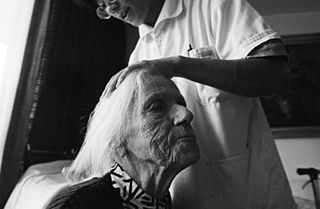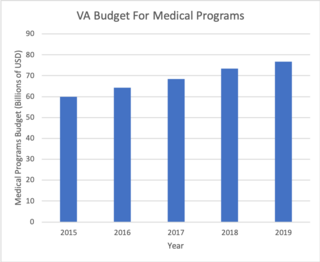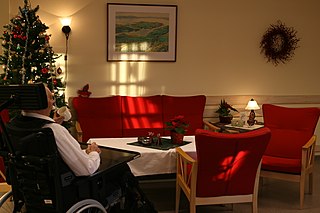
Home care is supportive care provided in the home. Care may be provided by licensed healthcare professionals who provide medical treatment needs or by professional caregivers who provide daily assistance to ensure the activities of daily living (ADLs) are met. In-home medical care is often and more accurately referred to as home health care or formal care. Home health care is different non-medical care, custodial care, or private-duty care which refers to assistance and services provided by persons who are not nurses, doctors, or other licensed medical personnel. For patients recovering from surgery or illness, home care may include rehabilitative therapies. For terminally ill patients, home care may include hospice care.

A nursing home is a facility for the residential care of older people, senior citizens, or disabled people. Nursing homes may also be referred to as care homes, skilled nursing facilities (SNF) or long-term care facilities. Often, these terms have slightly different meanings to indicate whether the institutions are public or private, and whether they provide mostly assisted living, or nursing care and emergency medical care. Nursing homes are used by people who do not need to be in a hospital, but cannot be cared for at home. The nursing home facility nurses have the responsibilities of caring for the patients' medical needs and also the responsibility of being in charge of other employees, depending on their ranks. Most nursing homes have nursing aides and skilled nurses on hand 24 hours a day.

The Veterans Health Administration (VHA) is the component of the United States Department of Veterans Affairs (VA) led by the Under Secretary of Veterans Affairs for Health that implements the healthcare program of the VA through a nationalized healthcare service in the United States, providing healthcare and healthcare-adjacent services to Veterans through the administration and operation of 146 VA Medical Centers (VAMC) with integrated outpatient clinics, 772 Community Based Outpatient Clinics (CBOC), and 134 VA Community Living Centers Programs. It is the largest division in the Department, and second largest in the entire federal government, employing over 350,000 employees. All VA hospitals, clinics and medical centers are owned by and operated by the Department of Veterans Affairs as opposed to private companies, and all of the staff employed in VA hospitals are government employees. Because of this, Veterans that qualify for VHA healthcare do not pay premiums or deductibles for their healthcare but may have to make copayments depending on what procedure they are having. VHA is distinct from the U.S. Department of Defense Military Health System of which it is not a part.
An assisted living residence or assisted living facility (ALF) is a housing facility for people with disabilities or for adults who cannot or who choose not to live independently. The term is popular in the United States, but the setting is similar to a retirement home, in the sense that facilities provide a group living environment and typically cater to an older adult population. There is also Caribbean assisted living, which offers a similar service in a resort-like environment.
In healthcare, an orderly is a hospital attendant whose job consists of assisting medical and nursing staff with various nursing and medical interventions. These duties are classified as routine tasks involving no risk for the patient.
Pet sitting is the act of temporarily taking care of another person's pet for a given time frame. It commonly occurs at the pet owner's home, but may also occur at the provider's home or at a pet sitting place of business or organization. Pet sitting is a more personal and individualized arrangement for care compared to boarding or kenneling. Specialized training is usually not required for pet sitting.

Long-term care (LTC) is a variety of services which help meet both the medical and non-medical needs of people with a chronic illness or disability who cannot care for themselves for long periods. Long-term care is focused on individualized and coordinated services that promote independence, maximize patients' quality of life, and meet patients' needs over a period of time.
A Nursing Agency is a service provider agency which provides nurses and usually health care assistants to people who need the services of home healthcare professionals. Nurses are normally engaged by the agency on temporary contracts and make themselves available for hire by hospitals, nursing homes, eldercare centers, and other providers of care for help during busy periods or to cover for staff absences. Some nurses may be seconded to private clients who choose to receive their nursing care within their own homes.
Residential care refers to long-term care given to adults or children who stay in a residential setting rather than in their own home or family home.
Home health nursing is a nursing specialty in which nurses provide multidimensional home care to patients of all ages. Home health care is a cost efficient way to deliver quality care in the convenience of the client's home. Home health nurses create care plans to achieve goals based on the client's diagnosis. These plans can include preventive, therapeutic, and rehabilitative actions. Home health nurses also supervise certified nursing assistants. The professional nursing organization for home health nurses is the Home Healthcare Nurses Association (HHNA). Home health care is intended for clients that are well enough to be discharged home, but still require skilled nursing personnel to assess, initiate and oversee nursing interventions.
Private duty nursing is the care of clients by nurses, who may be licensed as RNs or LPNs/LVNs.
Respite care is planned or emergency temporary care provided to caregivers of a child or adult.
Primary nursing is a system of nursing care delivery that emphasizes continuity of care and responsibility acceptance by having one registered nurse (RN), often teamed with a licensed practical nurse (LPN) and/or nursing assistant (NA), who together provide complete care for a group of patients throughout their stay in a hospital unit or department. While the patient is on the nurses' unit, the primary nurse accepts responsibility for administering some and coordinating all aspects of the patient's nursing care, with the support of other members of the nursing staff. This results in the nurse having greater insight into the patient's condition, both medical and emotional.

Sharp HealthCare is a not-for-profit regional health care group located in San Diego. Sharp includes four acute care hospitals, three specialty hospitals, three affiliated medical groups, and a health plan. Sharp has approximately 2,600 physicians, and more than 18,000 employees.
A professional live-in caregiver provides personal care and assistance to individuals, including those suffering from chronic illness, Alzheimer’s disease, and dementia, within the home setting. Typical duties of a live-in caregiver include meal planning and preparation, assistance with grooming, dressing and toileting, medication management, laundry and light housekeeping, and transportation/escorts to doctor’s appointments or social engagements. Professional live-in caregivers are often provided by an outside agency, which may also coordinate their services with the client’s preferred in-home health agency and other medical providers.

A hospital bed or hospital cot is a bed specially designed for hospitalized patients or others in need of some form of health care. These beds have special features both for the comfort and well-being of the patient and for the convenience of health care workers. Common features include adjustable height for the entire bed, the head, and the feet, adjustable side rails, and electronic buttons to operate both the bed and other nearby electronic devices.
Unlicensed assistive personnel (UAP) are paraprofessionals who assist individuals with physical disabilities, mental impairments, and other health care needs with their activities of daily living (ADLs). UAPs also provide bedside care—including basic nursing procedures—all under the supervision of a registered nurse, licensed practical nurse or other health care professional. UAPs must demonstrate their ability and competence before gaining any expanded responsibilities in a clinical setting. While providing this care, UAPs offer compassion and patience and are part of the patient's healthcare support system. Communication between UAPs and registered nurses (RNs) is key as they are working together in their patients' best interests. The scope of care UAPs are responsible for is delegated by RNs or other clinical licensed professionals.
As of 2017, approximately 1.4 million Americans live in a nursing home, two-thirds of whom rely on Medicaid to pay for their care. Residential nursing facilities receive Medicaid federal funding and approvals through a state health department. These facilities may be overseen by various types of state agency.
Community nursing is nursing care delivered outside acute hospitals, for example in the home, within General Practice facilities, in community hospitals, in police custody, at a school or in a care home. In the UK, a community nurse needs a degree approved by the Nursing and Midwifery Council, as well as 1–2 years’ experience as a qualified Adult Nurse.
Homecare is health care or supportive care provided by a professional caregiver in the individual home where the patient or client is living, as opposed to care provided in group accommodations like clinics or nursing home. Homecare is also known as domiciliary care, social care or in-home care. It comprises a range of activities, especially paramedical aid by nurses and assistance in daily living for ill, disabled or elderly people.





